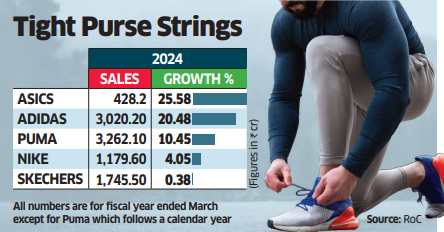
Demand for sportswear from running shoes to joggers and yoga mats slowed down for leading firms such as Puma, Adidas, Nike, Skechers and Asics, halting their sprint since the easing of the Covid-19 pandemic when they doubled their sales in two years.
Sportswear firms have reported 1-25% year-on-year increase for 2023-24, down from 35-85% increase for the previous financial year, according to the latest regulatory filings. While demand for fitness wear and sports equipment for disciplines other than cricket grew as people prioritised health with the onset of Covid-19, consumers cut back on discretionary spends across categories over the past six to eight quarters.

Experts said companies capitalised on the popularity of more casual styles in the wake of the pandemic, a trend that has subsided now although people are more health conscious than ever. A broader slowdown, especially in cities, hurt premium categories including sportswear, which are completely dominated by global players.
“Sportswear or footwear has a slower replacement cycle than apparel and lifestyle products. Also, there is a distinct slowdown as it all comes down to income growth versus inflation. So, a longer term potential still remains for the segment but there is a short-term consumption stress,” said Devangshu Dutta, founder of retail consulting firm Third Eyesight.
With a population of 1.4 billion, India is among the fastest growing and largest international markets for footwear companies and over the years companies such as Under Armour, Asics and Skechers have expanded aggressively in the country.
Puma India managing director Karthik Balagopalan said the category has outpaced market growth with mid to high single digit growth rates even as subdued demand has lagged expectations.
“When it comes to health and fitness, consumers continue to spend on performance products and our sports-first strategy also leans towards that. Our ambition continues to grow at or be above market CAGR (compound annual growth rate) over the mid-term, and we think we are in a good place with our back-end infrastructure, our product portfolio and pipeline, BIS (Bureau of Indian Standards) readiness and our best-in-class team, who will continue to cement and retain our lead on competition,” he said.
In October, Foot Locker entered India through a long-term licensing agreement with Metro Brands, which will own and operate stores, while Nykaa Fashion will be its exclusive e-commerce partner.
However, there are challenges. In August this year, the government made it mandatory for footwear companies to obtain BIS certification for more than a dozen footwear products including sports brands. This impacted sales even last year as BIS had not issued licences to several foreign brands whose products were manufactured outside India, which in turn, forced brands to cut down on supplies.
American footwear firm Skechers said in its last earnings call that it had been growing exceptionally well in India for several years but there was a bit of an anomaly in part because of some of the regulatory changes that it had not yet fully responded to.
“We continue to work closely with both our India team and regulators to further advance our local sourcing strategy. We are seeing positive trends and remain optimistic about the progress in this important market. We see tremendous opportunity, not only in our lifestyle business, but also in performance,” Skechers chief operating officer David Weinberg told analysts.












